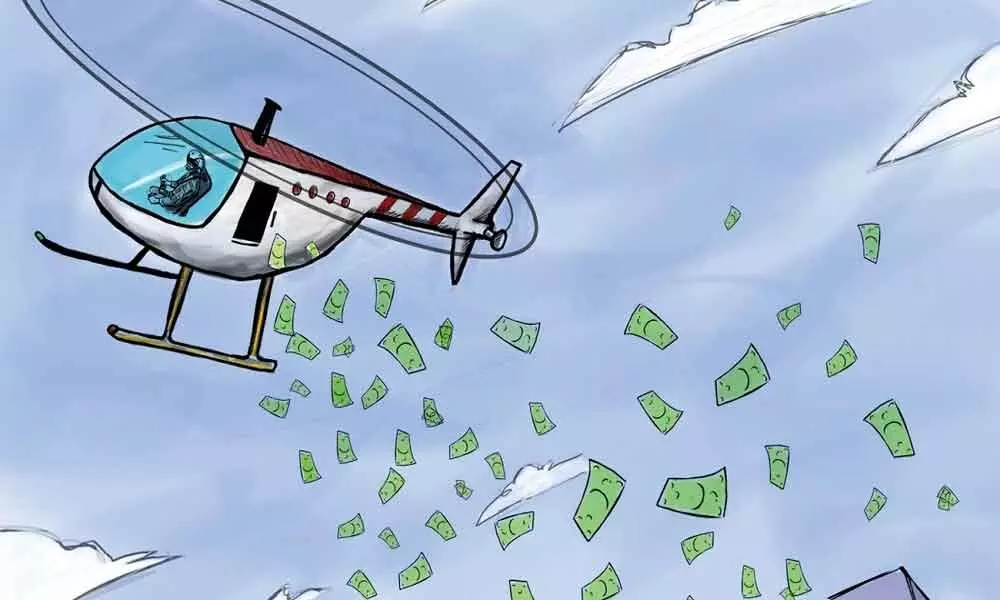Live
- Pawan Kalyan to Campaign for NDA Alliance in Maharashtra
- Eight killed, five injured in Nepal's traffic accident
- Technical snag grounds PM Modi's aircraft in Jharkhand
- Divya Pillai FL from ‘Bhairavam’ unveiled
- Tension in Lagcherla as BRS Leaders Allegedly Incite Landless Poor
- India vs South Africa 4th T20I Today: Know About Venue, Squad, Start Time, and Live Streaming Details.
- Abhishek says ‘sounds cool’ to be making a film about ‘someone who has 100 days to live’
- Samsung to buy back stock worth $7.16 billion to boost shareholder value
- ICC Champions Trophy 2025: Trophy tour to start from Islamabad on November 16; to travel to Karachi, Lahore and Rawalpindi
- Nazara Technologies sees Q2 profit decline 33 pc to Rs 16 crore
Just In

Helicopter Money: The entire country is observing Janata Curfew today following Prime Minister Narendra Modi's appeal for people to voluntarily stay indoors to check the spread of Coronavirus (COVID-19).
Helicopter Money: The entire country is observing Janata Curfew today following Prime Minister Narendra Modi's appeal for people to voluntarily stay indoors to check the spread of Coronavirus (COVID-19). Public transport has been suspended or curtailed and all markets and shops except those dealing in essential items are closed. It is a self-regulated drive which will come into force at 7 today morning and will continue till 9 pm.
Prime Minister Narendra Modi has called upon people to be a part of the Janata Curfew, which will add tremendous strength to the fight against COVID-19 menace. At present, the world including India is going through extraordinary times because of the devastating impact of the pandemic on the lives and national economies. Under such a situation, the governments and central banks around the world have either unveiled or are unveiling financial rescue packages, but there is a need for more citizen-friendly approach.
The more citizen-friendly approach is required because such lockdowns to contain the impact of the pandemic on citizens as well as the economy will stop the movement of people by confining them at their homes. Such confinements will not only reduce sales of products but also create production loss situation as the production depends on demand.
Similar undeclared lockdown - in which big corporates asked their employees to avail the work from home options by restricting their movement – has already had an impact on the economy as it stopped or slowed the movement of money from an individual to informal sectors like shops, malls restaurants, theatres among others, where it is invested.
But, such a declared lockdown can have a severe impact on the economy as it will put the money movement on hold. Thus, such a practice is giving rise to a question what can be done to protect the entire economy, which has been slowing since March 2019, if social distancing for an intermediate period is the only solution to deal with Coronavirus, aka COVID-19? This question is giving rise to the popular textbook theory called, 'Helicopter Money'. This is only the measure that can be adapted to deal with the economic fallout of COVID-19.
Helicopter Money
Helicopter Money is an unconventional monetary policy tool that is used when the economy is in a liquidity trap – when the interest rates are near zero and the economy remains in recession. Under the scheme, the central banks make direct payments to individuals. The concept was suggested by Milton Friedman, a Nobel–prize economist, in 1969, in which he said, in severe crisis, the central banks could print money and drop it from helicopters onto a grateful populace and raise their income levels and enable them to spend more
Such an effort was seen earlier this week in India in which the Uttar Pradesh Government announced that it would make online payments to poor and daily wage workers if they lost their work because of the global pandemic. The beneficiaries include construction workers, vegetable vendors, rickshaw pullers, daily wage earners and temporary staffs at shops among others whose earnings have collapsed due to severe restrictions on economic activity.
In addition to this, the Punjab Government today announced an immediate relief of 3000 rupees each for all the registered construction workers in the state assuring all help from the government. The effort was made to help the section who will suffer because of the 'Janta Curfew' and the restrictions imposed by the state government as a precautionary measure to contain the novel coronavirus.
Punjab Chief Minister Captain Amarinder Singh said the money would be transferred in the bank accounts of the workers by Monday in a bid to mitigate the hardships being faced by them in the wake of the Coronavirus outbreak, which has brought all construction activity in the state to a standstill.
Such an economic lockdown will have a direct impact on this segment, the most vulnerable section of the society who doesn't have deep pockets and weak borrowing power. They need immediate handholding and putting money directly in their bank accounts/hands is the only possible way to protect them.
Thus, other states of India should make similar efforts to help the vulnerable section in their respective states to survive without any pain.
A similar practice was earlier seen in the United States of America where President Donald Trump and Treasury Secretary Steven Mnuchin proposed a scheme under which they will mail out cheques worth up to $ 1,000 to American adults.

© 2024 Hyderabad Media House Limited/The Hans India. All rights reserved. Powered by hocalwire.com







